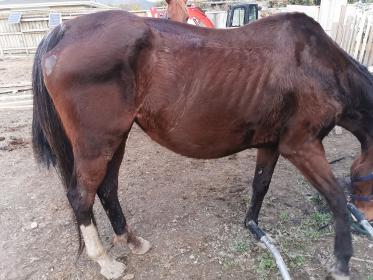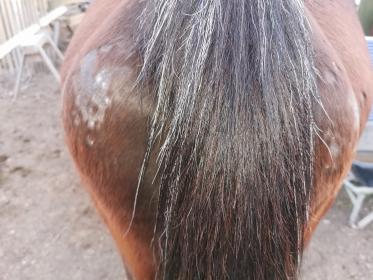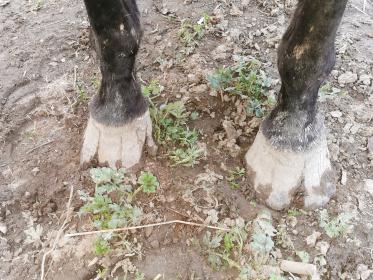I am no expert in pregnant mares, but what I do know is that you don’t want to suddenly throw a lot of grain/feed on an emaciated horse - it has to be done gradually, over several weeks.
That said, lots of really good quality hay would be a start. I’m not aware if alfalfa is contra-indicated in pregnant mares or not, but it is a good addition to grass hay in whatever form is available in your area (cubes, pellets, compressed bales, etc. - fed in very small quantities to start with, multiple times a day, gradually increasing). Pasture if that is available as well.
You’re not going to be able to plump her up overnight. It will take time. She’s going to need a lot more calories to produce milk to nurse that baby. I’m sure many on here can tell you the best feed regiment to ramp up her intake and calorie content over the coming weeks. There are special feeds for pregnant/lactating mares - but I’m unsure if they have enough fat in them so she will gain weight. Usually people are worried about pregnant/lactating mares getting too fat, which obviously isn’t the problem here.
I’d expect a starved mare to potentially have an underweight or weak foal. Her body condition may keep her from having adequate milk for the foal. Best to prepare in advance for all contingencies (like a milk replacer). I guess the good news is that she isn’t a maiden and has had 5 foals already. So she’s done this before.
I’d contact your vet again via email to see about worming. You can always take a fecal sample to your clinic (if they offer that service) to test for worms. If there is a low count, then that’s one less thing to worry about right now. If the count is high, then go with whatever the vet says to do. I know there are certain wormers that are approved for pregnant mares - so make sure you use one of them.
I wish you luck with her and her foal to be.





 Pictures can be deceiving, but just from this one side view she doesn’t look bad enough to warrant being super careful about re-feeding syndrome. I wouldn’t just throw grain at her, I’d still be careful, and I know you’re currently feeding just hay so that’s good. You just may not have to go as slow with that as the seriously thin horse. Introduction to the Spring grass will be the bigger issue most likely - that’s going to have to go pretty slowly
Pictures can be deceiving, but just from this one side view she doesn’t look bad enough to warrant being super careful about re-feeding syndrome. I wouldn’t just throw grain at her, I’d still be careful, and I know you’re currently feeding just hay so that’s good. You just may not have to go as slow with that as the seriously thin horse. Introduction to the Spring grass will be the bigger issue most likely - that’s going to have to go pretty slowly